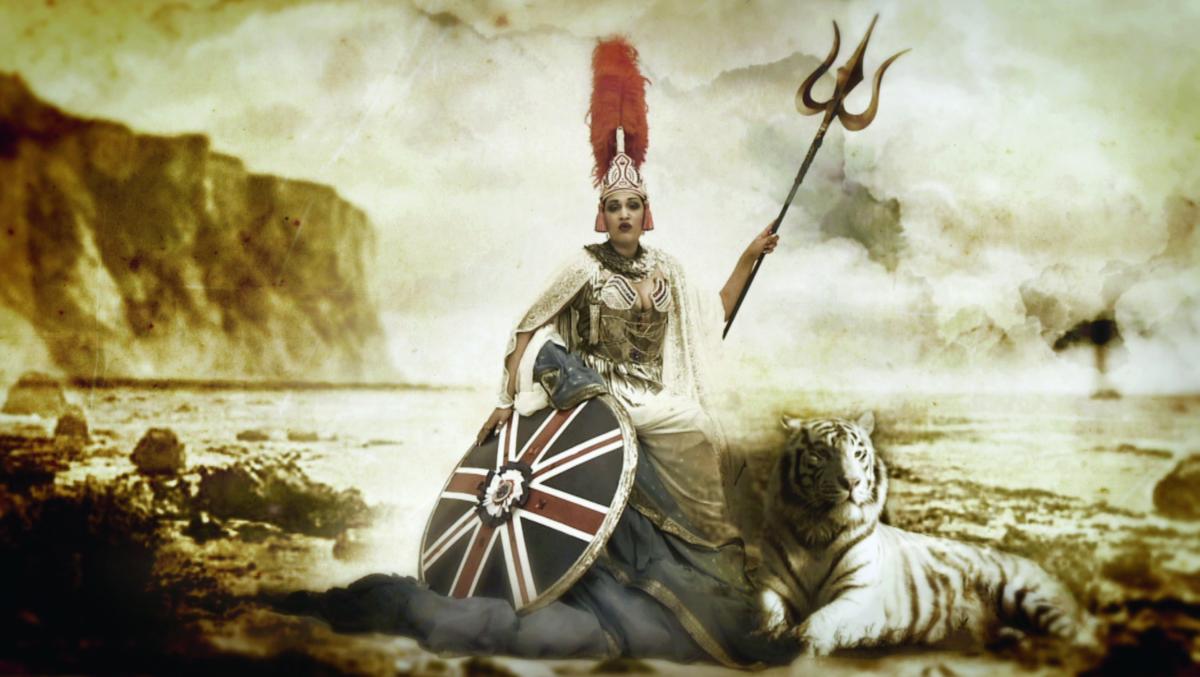
Redefining Englishness
The music of the british artist Bishi Bhattacharya works perfect as a comment on Brexit. In her songs and artwork, she is hijacking and redefining notions of being «british» and claims a multicultural commonwealth. From the Norient book Seismographic Sounds (see and order here).
«The joyous expression of the collision of worlds»: this is how Bishi Bhattacharya describes Albion Voice, her 2012 album, which slipped into the world with a daringly loud rhetorical understatement. Its release was finely timed. 2012 was the year of Elizabeth II’s Diamond Jubilee; and the CD’s cover featured Queen Bishi centered in a coat of arms and supported by a Bengal tiger (instead of the royal lion and the unicorn). Just as Jamie Reid’s Situationist-influenced image of Elizabeth for the Sex Pistols’ single «God Save the Queen» spoke to social unrest in 1977, so Albion Voice’s redrawing of the queen as Indian royalty says much about 21st-century Britain. Moreover, in taking the elements of Englishness and subjecting them to a radical détournement, Bishi turns Englishness into the exoticized other, a series of images and sounds to be usurped and collaged.
«Albion Voice», the song that gives the album its title, sits within a larger, 70-minute live multimedia project that has the modest intention of redefining British – and specifically, English – song. Bishi and her musical collaborator Matthew Hardern cite inspirations from many sources: writers such as Sukhdev Sandhu, whose London Calling is a study of the undersung role played by black and Asians writers in the UK; and Michael Bracewell, whose England Is Mine is an exploration of the origin of pop in marginal communities. Geoffrey Chaucer (c.1343-1400), the first English poet, is another key influence: «Albion Voice» begins with a setting of the prologue from The Canterbury Tales, his 14th-century poem of pilgrimage. Even the concept of «Albion» in Bishi’s title is significant. An ancient word for Britain, it still conjures up associations with the mythic world of King Arthur and the visions of poet William Blake. «Albion Voice» goes to the heart of what constitutes English music and poetry and asks the fundamental question: who does it belong to? The answer comes via its defiant chorus line, «I’m Indian in skin, but English at heart… I’m of Indian skin, but Albion voice.»
«Albion Voice» plays a complex game of annexation. This high-art pop song is a complete rerouting of English pastoral song. Just as the British Empire once claimed India, now someone of «Indian skin» claims England. It is a complete reversal of a process begun by the Beatles and taken up by subsequent sixties pop bands in which «Indian» sounds were brought into an otherwise Westernized music as a conspicuous statement of Oriental otherness. The radical nature of «Albion Voice» extends beyond its import of English into Indian systems of representation, however, as Englishness is – in all its fetishized glory – recast for a multicultural commonwealth.
This text was published first in the second Norient book «Seismographic Sounds».
Biography
Shop

Published on June 27, 2016
Last updated on April 10, 2024
Topics
From Beyoncés colonial stagings in mainstream pop to the ethical problems of Western people «documenting» non-Western cultures.
From Self-Orientalism in Arab music to the sheer exploitation of Brazilian funk music by acclaimed artists: how exotica examine aesthetics playing with the other and cultural misunderstandings.
How artistis deal with this non-natural but political category as a result of its ideological dominance.